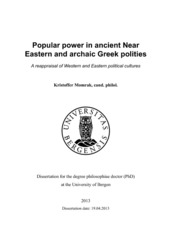Popular power in ancient Near Eastern and archaic Greek polities. A reappraisal of Western and Eastern political cultures
Doctoral thesis
Permanent lenke
https://hdl.handle.net/1956/6768Utgivelsesdato
2013-04-19Metadata
Vis full innførselSammendrag
The dissertation Popular power in ancient Near Eastern and archaic Greek polities – A reappraisal of Western and Eastern political cultures is a comparative investigation of political cultures in the ancient world, with an emphasis on the role of popular power in polities East and West. The aim is to challenge the widely held view that the ancient Greeks represent the earliest political culture in the world. The dissertation highlights the role of the people in the governance of polities in the ancient Near East and compares this to the politics of archaic Greek poleis. It is argued that there are several instances in Near Eastern law texts, legal documents, and letters where central authorities relied on or were tempered by formal and informal popular power. This is in contrast to the commonly held view that Near Eastern polities were despotic kingdoms where power was held by the great institutions of palaces and temples. The Greek evidence discussed consists of epic and lyric poetry of the archaic period, whereas the Near Eastern evidence consists of laws, legal texts, and letters from a range of different polities of the Bronze Age and Iron Age in Mesopotamia and Syria. It is argued that the view that the Greeks were the first political people of antiquity is to a large degree due to a certain way of investigating politics in the ancient world, where democratic Athens of the 5th century is used as a point of reference for popular power in all ancient polities. The lack of a formal political position for the people in Near Eastern polities is often taken as evidence of their despotic nature. The dissertation proposes a new approach to the analysis of ancient polities: by looking at the networks of strategies for power pursued by the citizens, popular political participation is revealed, in spite of the formal sovereignty of the rulers. Strategies for power are divided into narrow and broad élite and corporate strategies, making out a total of four different strategies for power that agents pursue within the polity in order to achieve their aims. In this approach, political action undertaken by all the agents of the polity is taken into account, including those who were not part of the ruling élite.
